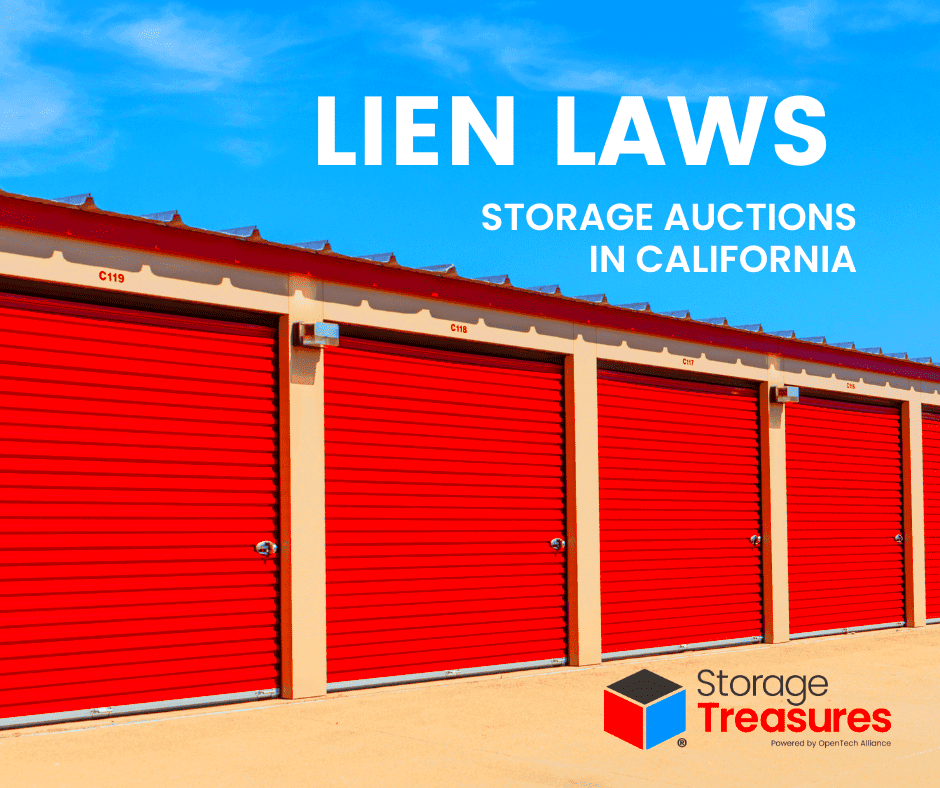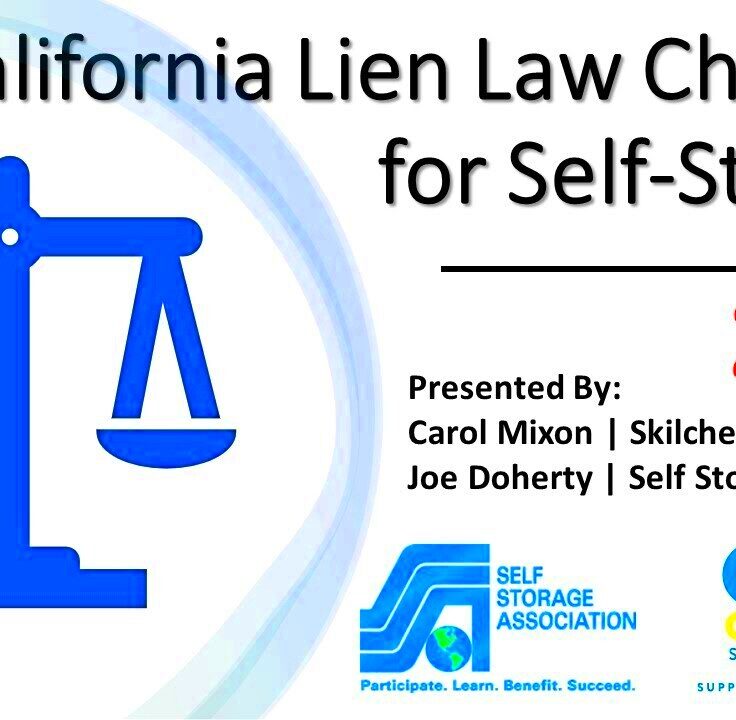How California Self-Storage Lien Law Affects You
California’s self-storage lien law is designed to protect the rights of storage facility owners while also ensuring tenants are aware of their obligations. If you rent a storage unit in California, it’s essential to understand how this law impacts you. This law outlines what happens if you fail to pay your rent, what the facility owner can do, and your rights as a tenant. By being informed, you can avoid unpleasant surprises and know the steps to take if you’re ever in a tough situation regarding your stored belongings.
What is a Self-Storage Lien

A self-storage lien is a legal claim that a storage facility has over the items you store if you don’t pay your rental fees. Think of it as a way for storage owners to secure their investment. If you fall behind on payments, the facility may have the right to sell your items to recover the owed rent. Here’s what you need to know:
- Types of Liens: There are typically two types: possessory liens and non-possessory liens. Possessory liens allow the facility to keep your items until you pay, while non-possessory liens can lead to the sale of your items after a legal process.
- Duration: In California, a lien generally remains until the debt is paid or the items are sold.
- Notice Requirements: Owners must provide notice before taking action, allowing you time to pay your debt.
How the Lien Process Works in California

The lien process in California is fairly structured. If you don’t pay your rent, here’s how it usually unfolds:
- Missed Payment: After you miss a payment, the storage facility will typically contact you to remind you of the outstanding balance.
- Notice of Lien: If payment isn’t received, the facility must send a formal notice, usually by mail, informing you of the lien on your items.
- Time Frame: California law requires a waiting period, often around 14 days, before further actions can be taken. This gives you a chance to pay your balance.
- Sale of Items: If you still don’t pay, the facility may auction your items. They must advertise this sale, typically in a local newspaper, to give others a chance to bid.
Understanding this process can help you take proactive measures, like communicating with the facility if you’re facing financial issues. Remember, being informed is your best defense!
Your Rights as a Storage Unit Tenant
As a tenant renting a storage unit in California, you have specific rights that protect you and your belongings. It’s crucial to know these rights so you can navigate any issues that might arise with your storage facility. Understanding your rights can empower you to advocate for yourself and ensure your items are handled fairly. Let’s explore some key rights you should be aware of:
- Right to Access: You have the right to access your unit during operating hours, even if you’re behind on payments, unless the facility has already taken possession.
- Right to Notice: If the facility intends to enforce a lien, they must provide you with a written notice detailing the amount owed and the steps they’ll take if you don’t pay.
- Right to Communication: You should receive clear communication from the facility regarding any overdue payments, upcoming sales of your items, and other relevant information.
- Right to Clean and Secure Facilities: The storage facility must maintain a clean and secure environment for your belongings, providing proper lighting and locks.
Being aware of these rights can help you take action if you feel they’re being violated. Remember, it’s always a good idea to review your rental agreement, as it outlines additional rights specific to your situation.
What Happens if You Don’t Pay Your Rent
Not paying your rent for a storage unit can lead to some significant consequences. It’s important to understand what could happen if you miss payments so you can make informed decisions. Here’s what generally happens:
- Initial Reminders: If you miss a payment, the facility will usually send reminders via email or mail. They want to give you a chance to pay before taking further action.
- Late Fees: Many storage facilities will charge late fees. These can add up quickly, making it more challenging to catch up.
- Notice of Lien: If your payment remains unpaid, you’ll receive a formal notice informing you of the lien placed on your belongings, including the total amount owed.
- Possible Auction: After a specified period, if you still haven’t paid, the facility can auction off your items to recover their losses. They must follow the legal process, which includes advertising the auction.
Missing payments can create a lot of stress, so if you’re struggling, it’s a good idea to communicate with your storage facility. They may offer payment plans or other solutions.
Steps Storage Facility Owners Must Follow
Storage facility owners in California must follow specific steps to enforce a lien or take possession of your items. These steps ensure that both tenants and facility owners adhere to the law, providing a fair process for all. Here’s what storage facility owners are required to do:
- Notify the Tenant: After a missed payment, the owner must send a written notice outlining the outstanding balance and informing the tenant of their rights.
- Wait Period: California law typically requires a waiting period (often 14 days) after sending the notice. This allows the tenant time to pay the debt before any further action is taken.
- Advertising the Sale: If the tenant does not respond or pay, the owner must advertise the sale of the items. This is usually done through local newspapers or online platforms.
- Conducting the Sale: The facility owner can then proceed with the sale, ensuring it follows the legal guidelines to ensure transparency and fairness.
By following these steps, storage facility owners not only protect their interests but also respect the rights of tenants. If you find yourself in this situation, knowing these steps can help you understand your options and rights better.
Tips for Tenants to Protect Themselves
As a storage unit tenant, it’s essential to take steps to protect yourself and your belongings. While self-storage facilities provide a valuable service, being proactive can help you avoid potential problems down the line. Here are some practical tips to keep in mind:
- Read the Rental Agreement: Before signing, make sure you understand the terms. Pay attention to payment schedules, late fees, and lien procedures.
- Keep Your Payment Records: Always keep track of your payments, whether through bank statements or receipts. This documentation can be vital if disputes arise.
- Set Up Payment Reminders: Use calendars or apps to remind you of upcoming due dates. Staying on top of your payments can prevent unwanted fees and liens.
- Communicate with the Facility: If you’re facing financial difficulties, talk to the storage facility management. They may offer flexible payment options or extensions.
- Consider Insurance: Check if your items are covered under your homeowner’s policy or consider purchasing storage insurance. This can protect your belongings from theft or damage.
By taking these precautions, you can help ensure a smoother experience with your storage unit and protect yourself from unnecessary stress.
Common Questions About Self-Storage Liens
Understanding self-storage liens can be confusing, especially if it’s your first time renting a unit. Here are some common questions that tenants often have:
| Question | Answer |
|---|---|
| What triggers a lien? | A lien is triggered when you fail to pay your rent for your storage unit according to the terms of your rental agreement. |
| How long does a lien last? | The lien remains in effect until the debt is settled or your belongings are sold. |
| Do I have to be notified of a lien? | Yes, the storage facility must notify you in writing before enforcing a lien on your items. |
| Can I reclaim my items after a sale? | Once items are sold, they cannot be reclaimed. It’s essential to address any payment issues before this happens. |
If you have further questions, don’t hesitate to reach out to your storage facility for clarification. It’s better to ask than to be caught off guard!
Conclusion
Understanding California’s self-storage lien law is crucial for anyone renting a storage unit. Knowing your rights and responsibilities helps you navigate potential issues more confidently. By staying informed about the lien process, you can take proactive steps to protect your belongings and yourself. Remember to communicate with your facility and take measures like keeping records and setting reminders. If you ever have questions or uncertainties, reach out for help. With the right knowledge, you can make your storage experience as smooth as possible.


